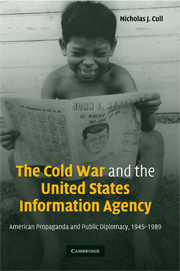 The Cold War and the United States Information Agency
The Cold War and the United States Information Agency Book contents
- Frontmatter
- Contents
- List of Illustrations
- Preface
- Abbreviations
- THE COLD WAR AND THE UNITED STATES INFORMATION AGENCY
- Prologue
- 1 Getting the Sheep to Speak
- 2 Mobilizing “the P-Factor”
- 3 In the Shadow of Sputnik
- 4 Inventing Truth
- 5 Maintaining Confidence
- 6 “My Radio Station”
- 7 Surviving Détente
- 8 A New Beginning
- 9 From the “Two-Way” Mandate to the Second Cold War
- 10 “Project Truth”
- 11 Showdown
- Epilogue
- Conclusion
- Selected Bibliography
- Index
- Plate section
7 - Surviving Détente
The Nixon Years, 1969–74
Published online by Cambridge University Press: 05 February 2015
- Frontmatter
- Contents
- List of Illustrations
- Preface
- Abbreviations
- THE COLD WAR AND THE UNITED STATES INFORMATION AGENCY
- Prologue
- 1 Getting the Sheep to Speak
- 2 Mobilizing “the P-Factor”
- 3 In the Shadow of Sputnik
- 4 Inventing Truth
- 5 Maintaining Confidence
- 6 “My Radio Station”
- 7 Surviving Détente
- 8 A New Beginning
- 9 From the “Two-Way” Mandate to the Second Cold War
- 10 “Project Truth”
- 11 Showdown
- Epilogue
- Conclusion
- Selected Bibliography
- Index
- Plate section
Summary
This whole Cold War … is essentially a clash of ideas. If we are not prepared to at least portray and advocate the ideas we believe in, we won't survive.
Frank Shakespeare, 1 May 1972.Richard M. Nixon launched his administration with a flourish. On the evening of 11 December 1968, the President-elect mounted an hour-long all-network television program to introduce his cabinet to the American people. The twelve cabinet officers and their wives sat in a row below the President's dais. Speaking without notes, Nixon moved along the line describing their careers and values. As the program's producer, Frank Shakespeare, had hoped, Nixon appeared statesmanlike, authoritative, and connected to his team. Even Democrats seemed impressed. But Nixon already had good reason to thank Shakespeare. A former president of television services at CBS, Shakespeare had also managed the television aspects of Nixon's presidential campaign. He used advertisements and a series of carefully managed television debates to show Nixon at his best and insulate him from the press. Shakespeare's strategy worked. Nixon won. Now Nixon chose Shakespeare to direct the USIA.
Soon after accepting the USIA job, Shakespeare received an unexpected invitation to call on former President Eisenhower in Walter Reed hospital. He found the old man propped up in a bed in a hospital gown. To Shakespeare's astonishment, Eisenhower's attendant left and the ex-President began a two-hour briefing on the history of the USIA and role of the director as “one of the most important jobs in the entire United States Government.”
- Type
- Chapter
- Information
- The Cold War and the United States Information AgencyAmerican Propaganda and Public Diplomacy, 1945–1989, pp. 293 - 332Publisher: Cambridge University PressPrint publication year: 2008


